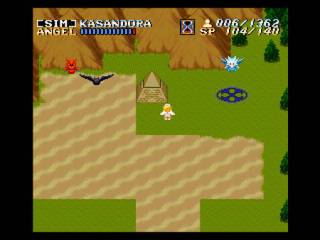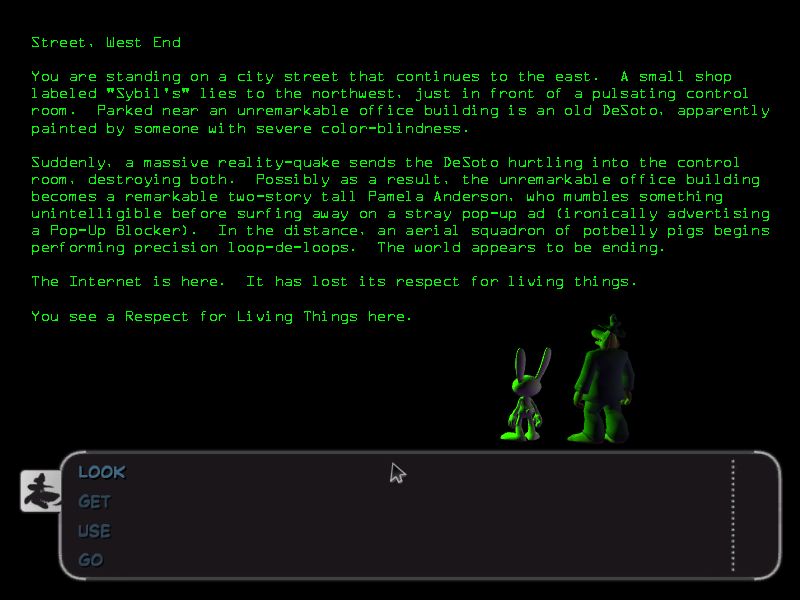Concerning "Adventure"
By vidiot 14 Comments
*WARNING* THE FOLLOWING THREAD HAS NOTHING TO DO WITH MODERN WARFARE 2 *WARNING*

*WARNING* THE FOLLOWING THREAD HAS NOTHING TO DO WITH MODERN WARFARE 2 *WARNING*
There will be no mention of Modern Warfare 2 in this thread. None. Really. I'm serious. My middle name is serious. Okay, so that was a lie. Wouldn't it be cool if my middle name was serious?
Vidiot Serious Westriverside Warehouserock XXVII
My last name is a bit long.

It's fun to think back, because as I get older I begin to see cycles in gaming history. This all came to head a few days ago, while I was doing my daily web surfing and daily surf boarding, when I ran across an article exclaiming "The Death of Single Player!" I've read this before. In fact, I think I've run across similar articles multiple times during over a decade, easily. Yet, single player has yet to die. Why is that? The first time I read that Single Player was on it's death bed was during the era of Counter Strike clones, and again a few years ago when WOW practically took over PC Gaming. The cycle is not exclusive to hypothetical concerns over single player dieing, but other stuff like videogame violence. Watching the events concerning the airport scene in Modern War....err... GTA, made me remember the fun flurry that we had during the early days of Mortal Kombat.
Recently I've come to a conclusion that was very dear to me. If there has been one great one great consistent reoccurring article, or subject that has been brought up time, and time again on internet forums and even gaming media, it's that adventure games are dead. DEAD I TELL YOU. Gaming took the adventure genre outside to your backyard, did terrible things to it, killed it, then proceeded to do even more terrible things to it after it was dead. Are you picturing what I am describing?! You know that scene in Final Destination 2, with that guy, and the part where he was ripped apart by barb wire? THAT'S WHAT HAPPENED TO ADVENTURE GAMING. Thanks to twitch games like Modern...Halo..
Or did it. Because I'm playing a lot of adventure games right now, and it's not one of my classic gaming runs. Was it that simple, that the genre simply croaked and died? To answer these questions thoughtfully, I think we need to go back to basics and try to explain what adventure gaming is. More particular, why we call it an adventure. These are terms we usually don't think about. What is an action adventure? Why is 'adventure' even added to that term?
Game Splicing, and Game Mechanic Evolution
We tend to think that the combination of genres is a relatively new concept, but in reality that's not necessarily true. Game Splicing has been around for quite some time now. One early, more dramatic example could be ActRaiser.


Yes, you moved blocks, it was basic and almost barbaric but the shift in 3D technology limited our gaze. As technology and design marched forward, what worked in a 2D environment began to get lost in the fray of 3D. It's gotten considerably better overtime.
Recently near the end of Uncharted 2, Nathan Drake has to utilize his journal to decipher an elaborate puzzle the concerns checking old scriptures and diagrams. The scene is expertly done, and if it was taken out of context, one could argue that Uncharted for that brief moment was an adventure game.
We take Game Splicing for granted now. We consider it as almost an evolution in game mechanics. These concepts, mechanics, can come from the same genre from different games. Game A has a cover mechanic that Game B then borrows, but it's the genre to genre combination that can be the most rewarding and the most unforgiving if incorrectly executed. Brutal Legend suffers from an identy crisis, a jack of all trades master of none trying to cram open world/Zelda/and an RTS in one game. While others like System Shock combine the finesse of RPG character creation, with horror and twitch shooting. (Thematic qualities "horror" can be apart of Game Splicing, but this is more relatable to Gameplay Mechanic Adaptation, versus mechanic functionality which we are talking about here.)
What's interesting that while we try haphazardly to combine the newest genre's with each other, we have totally lost sight, that we have continually succeeded in the greatest Genre Game Splicing of all time: Adventure games.
Defining Adventure
I don't think we have collectively classified adventure games correctly.
When someone brings up the term "adventure game", we immediately think of games like Monkey Island, Day of the Tentacle, Grim Fandango, and just about anything Lucas Arts was doing, before they learned that Star Wars was a profitable gaming business venture. I think another word needs to be added to the definition: Puzzle.
Puzzle Adventure Game, doesn't roll off the tongue as just Adventure Game, but it's probably the most accurate description of the genre your going to get. Who decided that a puzzle gameplay was synonymous to adventure? The term adventure is bold, giant term encompassing the likes of story and exploration. Story and exploration, specifically the exploration of a foreign world or environment you are not accustomed too. These concepts are basic, but you can see them extensively if you go back to adventure gaming's roots.
There are two games to consider. One called Adventure...and another...called....Adventure. *ahem* Let me break it down.
Vidiot breaks it down. Hurts himself.
Adventure (aka Colossal Cave, 1975-1977)

Argued to be the first text adventure ever, "Adventure" wasn't keen on elaborate item oriented puzzles, but exploration. You explored a giant cave, like most text adventures that would later followed (I have to mention Zork here, or I will be attacked by angry nerds.) Adventure would be described today as "Interactive Fiction" versus what we might regard as a game. It established the concept of exploration, which would later be expanded on in what is argued to be the first action adventure game...
Adventure (1979)

Probably the most common known, the 2600 game Adventure was also the first game to have an easter egg. Players explored a large environment (mazes) there was of course, no narrative or fiction to accompany the exploration. It was a form of splicing (and very basic mechanic adaptation.), combining twitch gameplay with exploration albeit very primitive exploration. The technology was not yet, on equal footing as the same intricate representation of text. This would change over time, as Text Adventures would eventually die...but their mechanics would be better represented thanks to the evolution of technology.
So, adventure games are dead?
No. The mechanics of adventure games have been spliced into almost all genres. We should try to refer to adventure games, of the point and click variety, to puzzle adventure games. This is due to their mechanics of solving puzzles in combination to environmental exploration and a strong focus on narrative. It's why we originally, and accurately, called Metroid: Prime a First Person Adventure game versus a First Person Shooter.
The puzzle adventure game went out of style and popularity, but it didn't die like it's text adventure ancestor. It wasn't swept up by the progress of technology, which usually results in the closest thing we can call a "true" death to a genre. There is still a viable market. TellTale knows this, as well as the intelligent minds behind Machinarium. A few years prior games like The Longest Journey and Syberia attracted critic's eyes for good reason. They can still tell a more cohesive plot than most twitch shooters like...er.................Halo... You can of course jump off from this ledge I've drawn you to into a myriad of debates and conversation, such as if there are adventure elements in roleplaying games, which would make sense as the very essence of a tabletop RPG is interactive fiction.
Regardless, the future for the Adventure game is a bright one. Seeing stuff like the revival of Monkey Island and Sam and Max were almost ludicrous concepts only a few years back, I predict the final chapter in this genre is not going to be written for a very long time.

I wore my friends Prestige Modern Warfare 2 night-vision goggles and scared everyone at a local Taco Bell. Old people are funny to scare. I think I'm evil. :D
Oh, and this is awesome.
